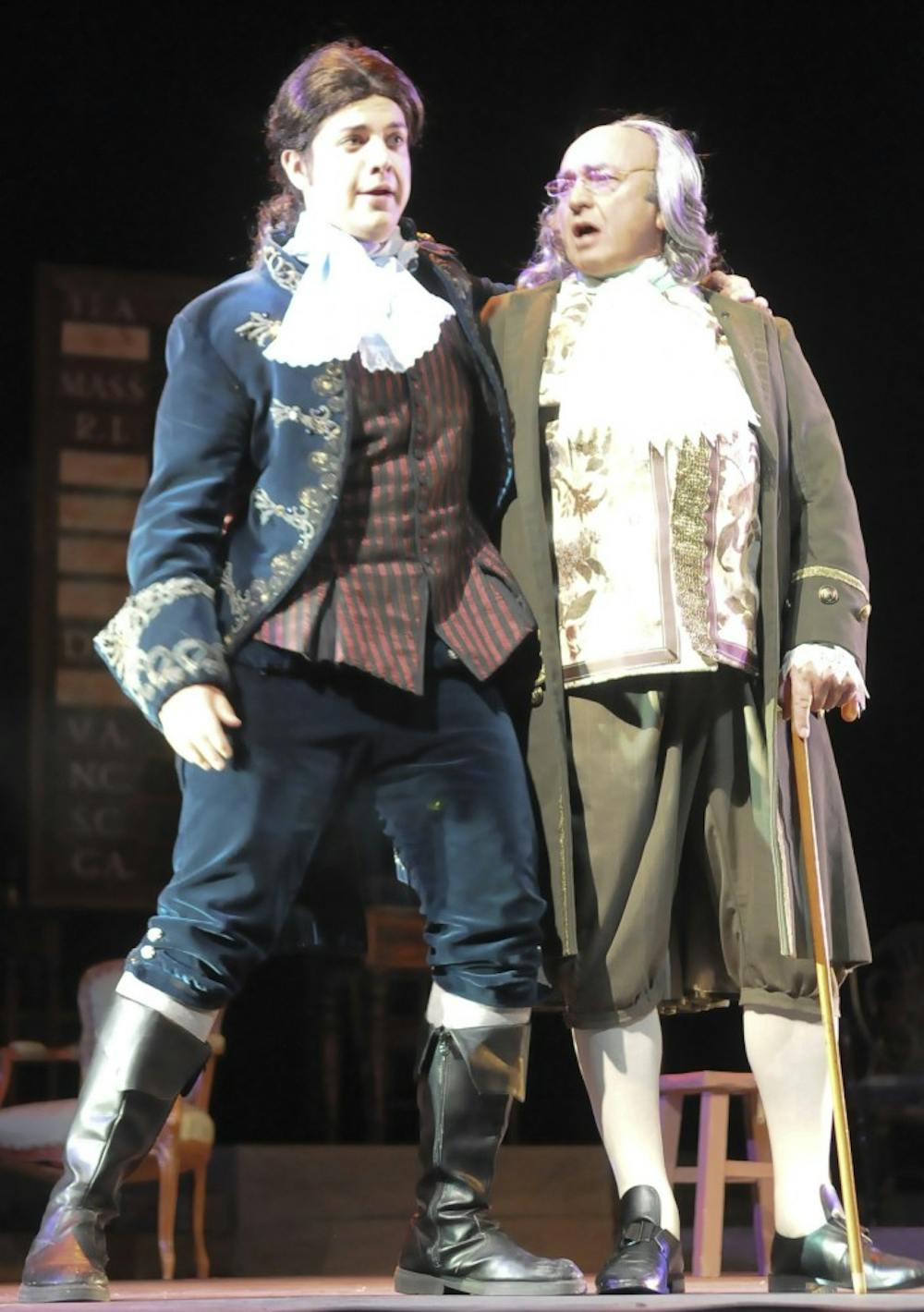gbgentz@unm.edu
The musical “1776” is not at all what you think it is.
Dry, right? Historical and, more than likely, lame.
But, no. This is a sexy, sexy show.
“1776” concerns itself with the Continental Congress of the American Revolution: Benjamin Franklin, John Adams, Thomas Jefferson, as well as many others who tend to get passed over in elementary school history classes. Then the writers add music and a slew of bawdy sex jokes.
The production itself is fantastic. A live orchestra sits in the pit of the Rodey Theatre, the costumes are great and the show is well-designed and well-directed. The cast is massive — 26 members in all — and the caliber of acting and singing is, on average, incredibly high, much higher than the vast majority of Albuquerque thespians could produce.
Hal Simons is an exceptional antagonist as the wealthy John Dickinson. Michael Finnegan truly becomes Benjamin Franklin, the great original American heckling pimp. David Aubrey’s Thomas Jefferson combines scene-stealing talent with considerable grace.
J.P. Sisneros, playing Richard Henry Lee, could use more stage time, as his single song is easily a highlight in the show.
The token women of the show, Amy Leigh Bingen and Kate Sarff, have relatively small parts but rock everything when they appear. Shawn Wayne King handles the lead of John Adams phenomenally as some kind of staccato Phil Hartman. The list goes on and on. These people seriously need to get out more and do more theater.
Certain moments make you forget that you’re watching community theater, which is what it’s all about. There are, however, almost three solid hours of moments. It’s a long show, which is somewhat standard for musicals of this kind.
There are also incredibly lengthy sections with no songs at all, just political and moral debate among the delegates. But the acting is so superb — carried exceptionally by Simons — that hopefully you won’t mind.
Technical issues seem common, unfortunately, which is a problem with an orchestra. It is impossible to hear many solo songs, even though it appears all the actors and actresses are wearing microphones.
The structure is also odd. Ninety percent of the action takes place in a single room, making it feel a bit like a musical “Twelve Angry Men.”
Get content from The Daily Lobo delivered to your inbox
However, one of the things you do expect in a musical about the signing of the Declaration of Independence is some viciously pronounced historical inaccuracy, and “1776” delivers this swimmingly.
Musicals are largely prefaced on a heavy suspension of disbelief, and often require it.
The Continental Congress is used as a literary device to portray embellished history while slipping in some anachronistic social commentary. It behaves much like a modern Congress with modern political debates and issues.
The real Continental Congress met in secret, but there really isn’t a sense of that. The representatives of each colony seem more like self-concerned figureheads than hidden rebels.
The most heated social debates deal with protecting one’s interests over the needs of all, as well as slavery.
Dickinson is written as the great holdout against the revolution, as well as a wealthy elite concerned only with himself. His solo song, “Cool, Cool Considerate Men” addresses “left” and “right” politics, as well as the very modern “haves and have nots.” Class warfare is by no means new, but this version of Dickinson is the conservative American self-interest of today, surrounded by American mythology.
When the issue of slavery finally appears, Jefferson verbally duels Edward Rutledge, representative of South Carolina. Adams and Jefferson attempt to take the moral high ground: Jefferson claims he already plans to free his slaves. Rutledge calls them on their general hypocrisy, in a very powerful number called “Molasses to Rum” performed stupendously by Bryan Daniels, though his voice is not quite deep enough. This sort of heavy preaching is somewhat lost when you consider that Jefferson never released all his slaves during his life, but Rutledge actually did.
“1776” strikes a weird spot between traditional and edgy. While trying its best to make social commentary, the mythology of America is upheld. But Landmark Musicals has simply produced the best and most professional local musical theater Albuquerque has seen in a long time.






